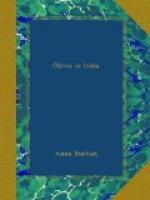We had nothing to look forward to at the end of the journey except a dak-bungalow’s cold welcome, but the Blackies, who live at Madhabad, insisted we should go home with them to dinner; so, instead of the tinned ham-and-egg meal we had expected, we had a dainty, well-cooked dinner in a cosy dining-room. Warmed and fed, we retired to our present resting-place, and found little comfort here. Autolycus and his coolies had only just arrived, and Autolycus was searching vainly for a lamp—a bati he called it. The floors are stone and as cold as the tomb. Mr. Blackie begged us to go back to his place for the night, but we wouldn’t hear of it. Autolycus ran a lamp to earth; we explored for bedrooms and found two, in which he hastily made up beds. They are damp, and far from clean; but one learns to put up with a lot in the Mofussil, and in a very short time we had forgotten our troubles in sleep.
This morning I rose betimes and went out to the verandah, and there I found—quite suddenly—a handsome young man. It seems he too is staying in this eligible mansion. He is an engineer—a bridge-builder, I think—and this is convenient for his present work. He was in bed and asleep, and didn’t hear us arrive last night; so he was as surprised to see me as I was to see him. When Boggley appeared we had breakfast together. It was interesting hearing about the kind of life this young man leads. He says although Madhabad is not gay, it is Piccadilly compared to where he often is, out in camp, forty miles from another European, with not a soul to speak to from week to week. The evenings are the dreariest times, and he often goes to bed immediately after dinner. He was quite cheerful, and said he liked the life. Madhabad is a large village, but the Blackies are the only Europeans. There are a lot of planters, however, living round about. We had callers this morning. Mr. Royle, to whose place we go on Monday, rode over with his two small daughters, to say they would expect us to stay with them. We meant to camp, but it will be much pleasanter to stay with the Royles; everyone says they are charming people.
Boggley and I went for a walk after tea to see the country. There isn’t much to see except a long, straight brown road and a most insanitary-looking tank. The village is more interesting with its queer booths. I do think it is an incongruous sight to see, as I saw this afternoon, a native, naked but for a loin cloth, plying a Singer’s sewing-machine. The natives looked sullen and rather suspicious, or is it only that I imagine it because they are so unlike the broad-smiling Santals with their cheerful johar? There are four trees before this bungalow, and at present two vultures are perching on each—horrible creatures, with long, scraggy necks. I pointed them out to Boggley, who was immediately reminded of a tale of a bumptious young civilian, new to the country, who was told, by one who had suffered many things at his hands, that the birds were wild turkeys, a much-valued delicacy; hearing which the youth promptly shot some and sent them round to the ladies of the station. Do you believe that tale? I don’t.




